 Kawasaki Z400 - Service manual > Self-Diagnosis
Kawasaki Z400 - Service manual > Self-Diagnosis
Self-Diagnosis Outline
The self-diagnosis system is monitoring the following mechanisms.
DFI System and Ignition System
The d-diagnosis system has two modes and can be switched to another mode by operating the meter unit.
User Mode
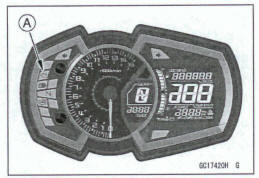
The ECU notifies the rider of troubles in DFI system and ignition system by lighting the yellow engine warning indicator light (LED) [A] when DFI and ignition system parts are faulty, and initiates fail-safe function. In case of serious troubles, ECU stops the injection and ignition operations.
Dealer Mode
The LCD displays the service code (s) [A] to show the problem (s) which the above system has at the moment of diagnosis.
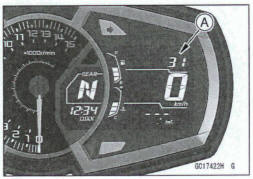
Self-Diagnosis Procedures
NOTE
Use a fully charged battery when conducting self-diagnosis. Otherwise, the warning indicator light (LED) and indicator do not light.
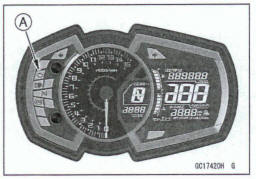
- Turn the ignition switch on and start the engine.
When a problem occurs with DFI system and ignition system, the yellow engine warning indicator light (LED) [A] stays on after starting the engine to alert the rider.
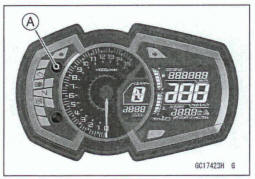
- Push the upper meter button [A] to display the odometer.
- Push the upper meter button [A] and lower meter button [B] for more than two seconds
- The service code [C] is displayed on the LCD by the number of two digits.
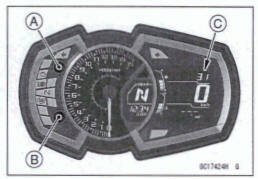
Any of the following procedures ends self-diagnosis.
- When the service code is displayed on the LCD, push the upper meter button and lower meter button for more than two seconds. The display will return b the previous display.
- When the ignition switch is turned off.
Self-Diagnosis Flow Chart
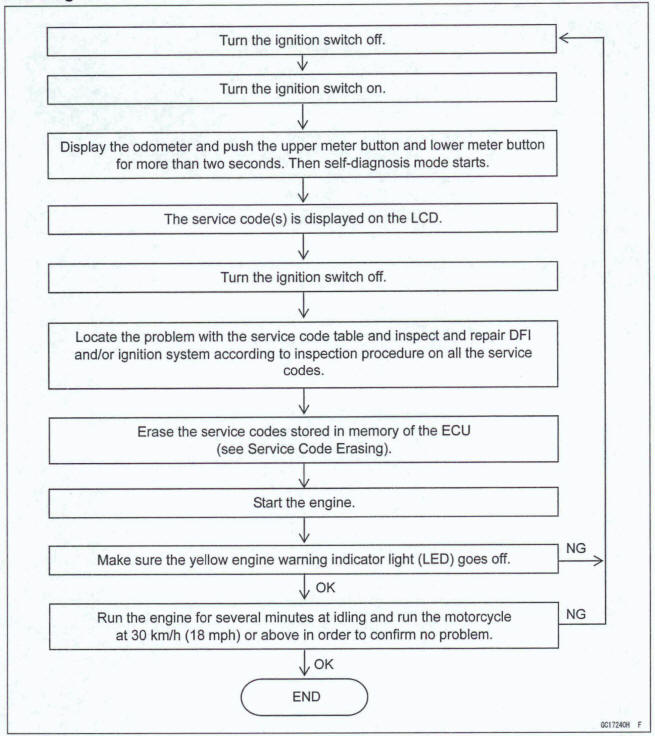
Service Code Reading
The service code (s) is displayed on the LCD by the number of two digits.
When there are a number of problems, all the service codes can be stored and the display will begin starting from the lowest number service code in the numerical order.
Then after completing all codes, the display is repeated until the ignition switch is turned off or upper meter button and lower meter button are pushed for more than two seconds.
For example, if three problems occurred in the order of 56, 11, 24, the service codes are displayed (each two seconds) from the lowest number in the order listed as shown. (11→24→56) →(11→24→56) →(repeated)
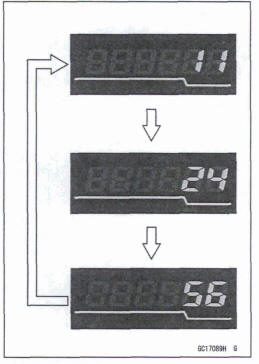
Service Code Erasing
The service codes stored in memory of the ECU can be erased using Kawasaki Diagnostic System.
If the Kawasaki Diagnostic System is not available, do the following procedures
1. Turn on the ignition switch and start the engine.
2. Keep the idling speed more than 30 seconds.
3. Run the vehicle more than 5 minutes at a speed of 40 km/h (25 mph) or more.
Be sure to keep the engine running during procedures 2 and 3 for more than 10 minutes in total.
4. Turn the ignition switch off.
5. Repeat the above procedures 3 times.
6. Start the engine and check that the yellow engine warning indicator light (LED) goes off.
Service Code Table
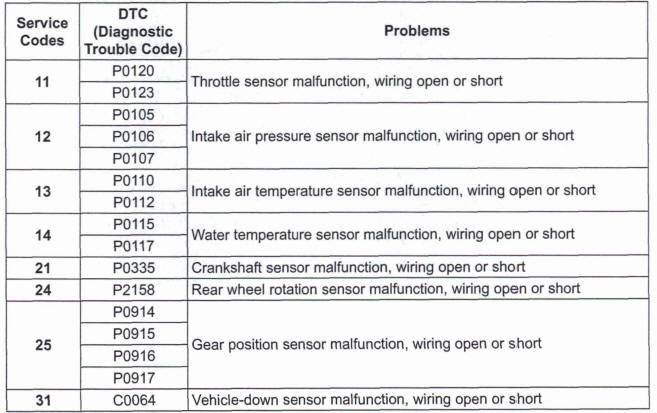
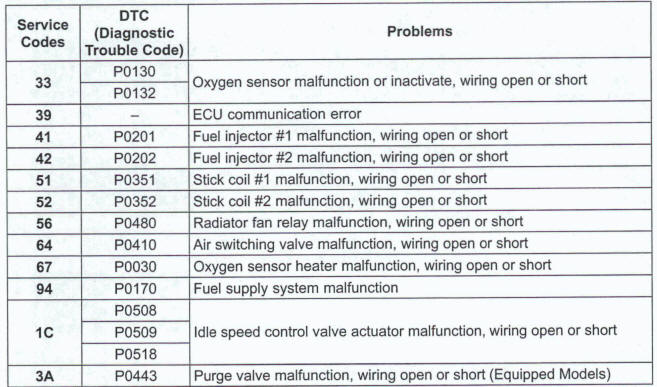
Notes:
- The ECU may be involved in these problems. If all the parts and circuits checked out good, be sure to check the ECU for ground and power supply. If the ground and power supply are checked good, replace the ECU.
- When no service code is displayed, the electrical parts of the DFI system has no fault, and the mechanical parts of the DFI system and the engine are suspect.
- DTC (Diagnostic Trouble Code) is displayed on the Kawasaki Diagnostic System and the Generic 1 Scan Tool (GST).
Backup
The ECU takes the following measures to prevent engine damage when the DFI or ignition system parts have troubles.
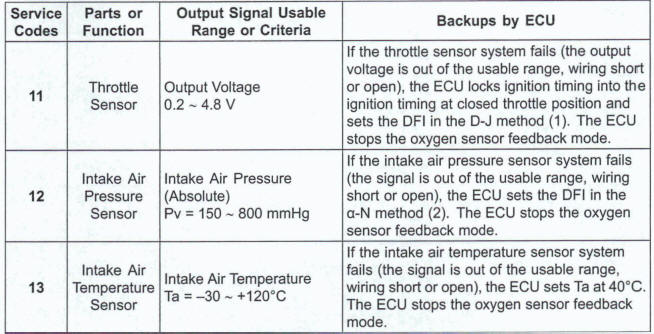
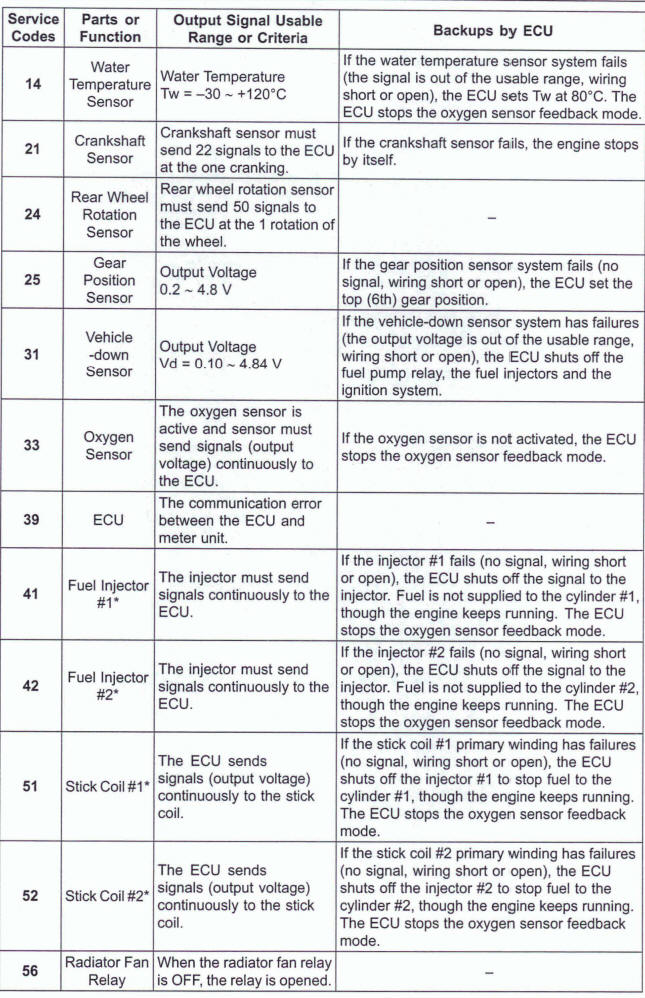
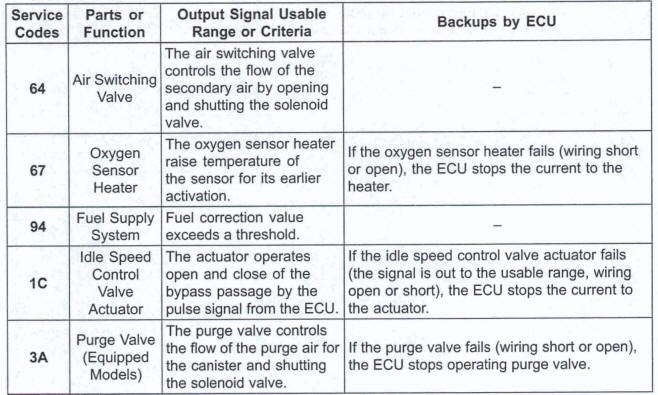
Note:
(1): D-J Method: When the engine load is light like at idling or low speed, the ECU determines the injection quantity by calculating from the throttle vacuum (intake air pressure sensor output voltage) and engine speed (crankshaft sensor output voltage). This method is called D-J method.
(2): a-N Method: As the engine speed increases, and the engine load turns middle to heavy, the ECU determines the injection quantity by calculating from the throttle opening (throttle sensor output voltage) and the engine speed. This method is called a-N method.
(*): This depends on the number of stopped cylinders.
See also:
 Kawasaki Z400 - Service manual > Troubleshooting the DFI System
Kawasaki Z400 - Service manual > Troubleshooting the DFI System
Outline When a problem occurs with DFI system, the yellow engine warning indicator light (LED) [A] stays on after starting the engine to alert the rider.
 Kawasaki Z400 - Service manual > Throttle Sensor (Service Code 11) (DTC W12Q, W123)
Kawasaki Z400 - Service manual > Throttle Sensor (Service Code 11) (DTC W12Q, W123)
The throttle sensor is a rotating variable resistor that change output voltage according to throttle operating. The ECU senses this voltage change and determines fuel injection quantity, and ignition timing according to engine rpm, and throttle opening.

 Benelli Imperiale 400
Benelli Imperiale 400 BMW F900XR
BMW F900XR Honda CB500X
Honda CB500X KTM 390 Adventure
KTM 390 Adventure Triumph Street Triple S
Triumph Street Triple S Yamaha MT-03
Yamaha MT-03 Kawasaki Z400
Kawasaki Z400 Triumph Street Triple S
Triumph Street Triple S Yamaha MT-03
Yamaha MT-03